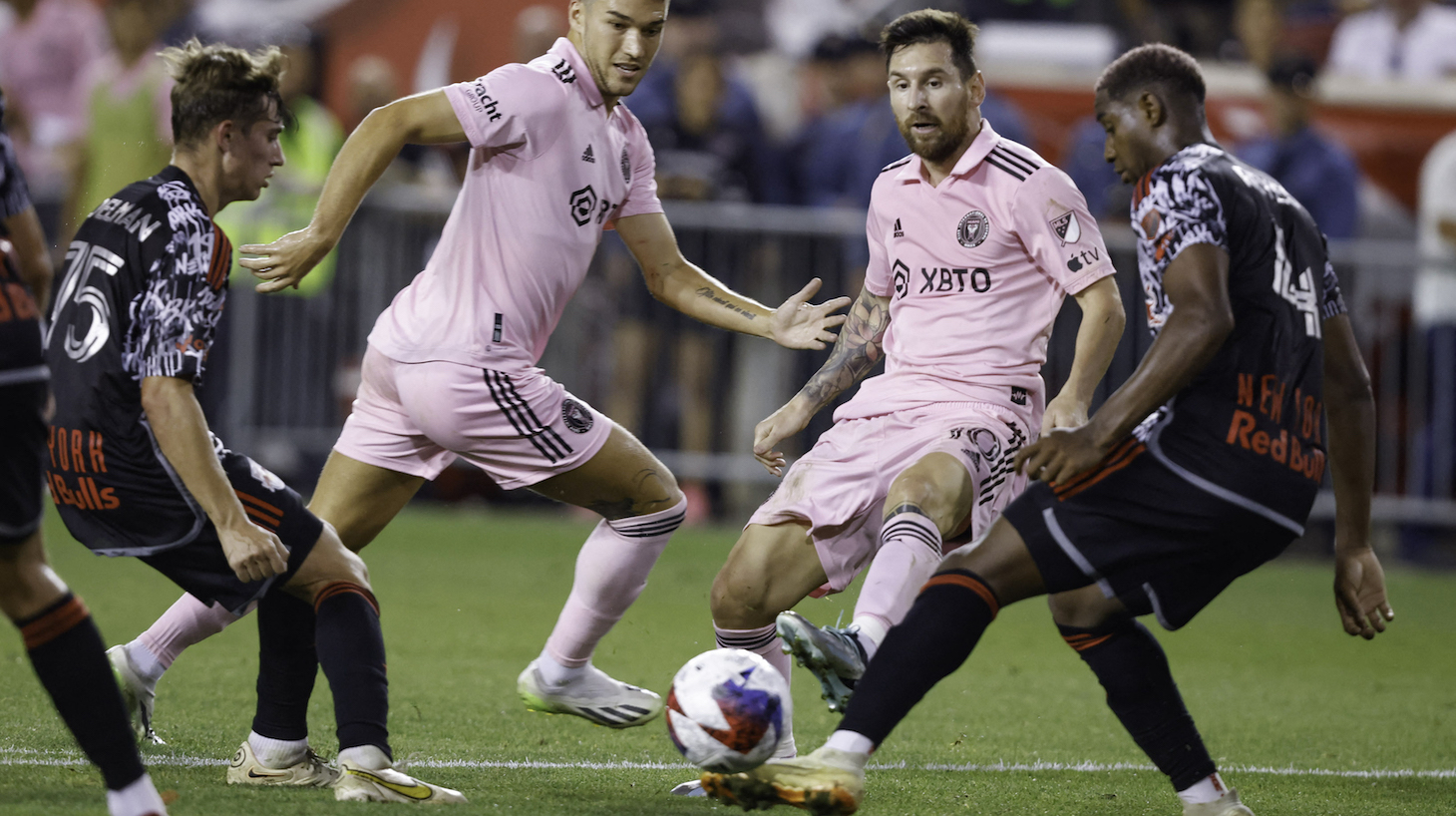It might sound strange, since clips from Messi en rose have been going viral every few days for a solid month now, but last night was actually Lionel Messi's very first match in MLS. It's perfectly befitting of MLS's whole deal how difficult it is to really parse the lay of the land: coming into Saturday's match, Messi had played eight matches for Inter Miami, won one trophy, qualified for the upcoming final of another cup tournament, but had yet to debut in the league, where Miami sat in the table's last place. What is much simpler to understand is that Messi is unbelievable.
That's enough preamble. Let's get to the only thing that really matters here: Messi came off the bench in Miami's away match against the New York Red Bulls and did something absolutely ridiculous.
Messi --> Cremaschi --> MESSI
— Major League Soccer (@MLS) August 27, 2023
OUT. OF. THIS. WORLD. pic.twitter.com/NzBKniNExm
My word, did you see that pass?! I really think it stands up to any of the hundreds of unbelievable passes he's played over his whole career. How did he even see that? How did he squeeze that pass between the three defenders closing him down, the two trying to cut off the passing lanes? That's five defenders! All trying stop little old him! And he beats them all! And he directs Ben Cremaschi's run! And he flicks the ball with the outside of his foot with just enough tension and english so that it rolls right where it needs to go for the defenders to miss it, Cremaschi to get to it, and it to not roll out of bounds! How is this man real?
We've really gotta show you it again—it's legitimately incredible, and this slowed down version is sublime:
El 🔟 en slow-motion 🤌 pic.twitter.com/anXPrX9Ne7
— MLS Español (@MLSes) August 27, 2023
This is what "creativity" means in soccer. It's not that—or not only that—Messi executed a play that other players would've tried but failed to. Rather, it's that this play did not exist before Messi looked around, clapped his hands, and said, "Let there be light!"
OK, so, we've established that the pass is magical. But as with almost every other Miami Messi highlight, you'd be remiss not to notice the defending. Because ... woof. That's five players who just completely switch off after Messi's pass, failing to offer even a token effort at tracking his run, which is what presents him an unmolested tap-in at the end.
Normally, I'd take this opportunity to make fun of the poor state of MLS defending. But I'm going to let them slide this time, because it's hard to judge them for being awed like everyone else who had seen what they just saw.
Messi's stint in America has, in effect, been experienced as one long highlight reel, for a couple different reasons. For one, it's because of his insane heroics, gifted to the world thanks to both his unreal talent and his defenders' ... inferior abilities. For another, it's because it's stupidly hard/expensive to watch Messi play an actual match. Of the nine matches he's played so far, not a single one has been broadcast on TV in English. Some of his games have aired on Telemundo and Univision, but besides that, the only (official) way to watch a complete Inter Miami match since Messi has joined has been to pay for one of the streaming services the league has partnered with. And as our own Tom Ley discovered last night, even if you already pay for Apple TV Plus, some matches, like last night's, are hidden behind yet another paywall.
This sucks ass. There's been a lot of talk since Messi joined the league about how galvanizing, even transformative a moment this could be for soccer in America. Watching Messi play is the best possible pitch to new potential fans that the sport is the best and most beautiful of them all. (It is indeed what converted me into a soccer nut during the 2006 World Cup.) But if Messi's presence on American soil was ever to be the mass conversion event it could be, it would be predicated on getting as many eyes as possible on him. To hold access to Messi's feats ransom by hiding them behind paywalls upon paywalls is to greatly limit the audience for them, which is to squander whatever transformative potential those feats had in this country.
MLS is hardly alone here. Widening access and thus deepening the pool of fans is decidedly out of style amongst the businesses that control soccer in America. NBC's handling of their Premier League broadcasts reflects this too. In the first, glorious couple years after NBC bought the league's rights, they televised literally every single league match live, and simultaneously made them all available to stream online for anyone with cable. Nowadays, you'll see maybe three or four EPL matches broadcast on TV on any given weekend, the rest of them only accessible with a Peacock subscription. The situation is similar with CBS, the Champions League, and Paramount Plus. It's clear that the business model of soccer in America isn't about creating new fans and growing the game, but rather about squeezing as much money as possible out of the already converted.
Obviously, there is a ton of interest in Messi's exploits in America. The hundreds of millions of views his highlights get is proof of this. In a better world, the barrier to entry to see him where he is most impactful—in live action over the course of an entire match, where the slow and methodical nature of the sport makes his spectacular interventions all the more electrifying—would be as low as possible, so that everyone who wants to watch him could, and those who didn't know they wanted to watch could discover it. This is not the world we live in. In light of that, I can hardly fault the New York Red Bull defenders from finding themselves caught up doing the thing everyone else wishes we could.






